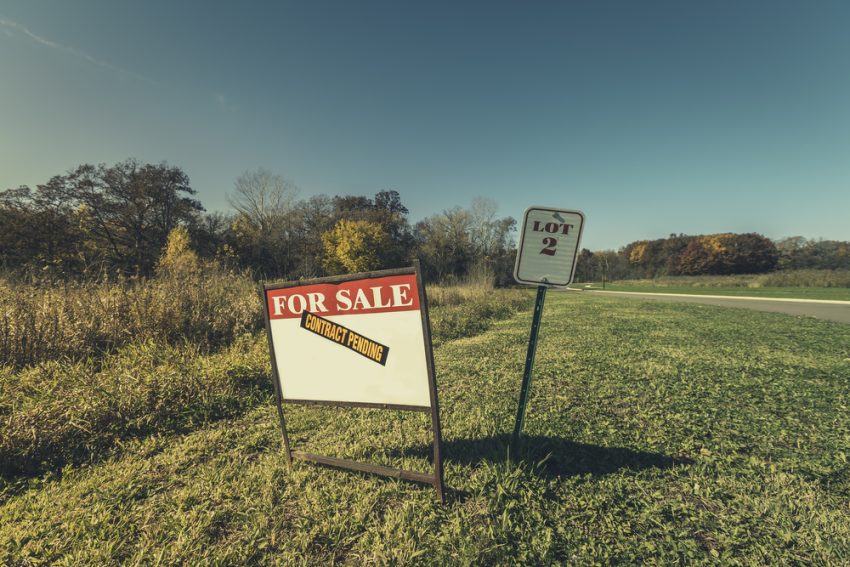
Published
Prepare your land to sell | Determine the value of your land | List your land for sale | Compare offers and terms | Fill out the paperwork and close
Selling a land-only property without a house requires fewer steps than a typical transaction when a real estate agent markets and shows a home. However, selling land without a realtor (or for sale by owner) can still be complicated.
Without in-house showings or open houses, there aren’t as many logistical items to consider. But since most potential home buyers are looking for a house, a smaller buyer pool means an offer might take longer.
» MORE: How To Sell Your House Without A Realtor
Prepare your land to sell
If you need to do any maintenance or clean up on the land, take care of it quickly, as it can be time-consuming. Both its location and condition can affect how the land is valued.
Ensure the property is safe for buyers before you start showings. Start by clearing the property of any debris or overgrown greenery. In more severe cases, like fallen trees, you may want to contact a professional land-clearing company for help.
📸 Take photos of the land, even when there’s no house
Photos in listings can illustrate the property’s boundaries and highlight unique features (like lakes, rivers, forests, or landscaping).
- For a smaller plot of land (less than an acre), a few wide-angle shots in different directions, plus a map outlining the property boundaries will be enough.
- If you have a larger piece of property, consider hiring a pro and ordering aerial photos.
(Note: The more rural the area, the bigger the expectation for land size.)
Aerial photos (i.e., taken using a drone) showcase the entire piece of land, giving buyers a better understanding of its size. A drone costs $50–100 per day to rent.
DIY tip: Once you have your digital photos, use a program like Photoshop to draw arrows that point out the property line, utility lines, or natural features.
Determine the value of your land
Valuing a plot of land is generally easier than valuing a home. However, there are some factors to consider if you are trying to calculate the value of your property.
The main factors in determining the land’s value include:
- Acreage (size)
- Location
- Zoning restrictions or easements that can affect the property’s use
- Land development features
- Recent sales
Access to public utilities, like water and sewage, can increase the land’s value. Without a sewer, the buyer may need to install a septic system, which adds to their costs.
Percolation test
A “perc test” looks at the property’s soil type, slope, and location of private wells. Land that passes a perc test can support a sewer system.
In many states and municipalities, an official inspector from the health department performs the perc test. Contact your local government for details on how best to order one. It typically costs $750 to $1,850, based on location and lot size.
Finding “comps” — similar plots of land that have recently sold in your area — can help you figure out a more accurate property value. Search for recent land sales with similar acreage within the past three to six months to get a snapshot of the market in your area. You can find this data in local property records or on real estate websites like Zillow.
You can also hire an appraiser for a more professional valuation.
Get a comparative market analysis
A CMA is an in-depth look at comps and the local market. A realtor can provide a more accurate valuation through a comparative market analysis report.
List your land for sale
Nearly half of all buyers start their search online. You can list your land on real estate websites like Zillow or on Facebook Marketplace for free.
For the best results, list your land on the multiple listing service (MLS), which realtors and brokers use to search and share listings. Listing your property on the MLS means more people will see it – and you’ll reach more prospective buyers.
Note: Without a real estate agent, you’ll communicate directly with the buyer or their agent.
Compare offers based on when you need cash in hand
An offer to buy land, usually called a land purchase agreement or land sale contract, will include the purchase price, method of payment, earnest money amount, time to close, and contingencies.
Proof of funds
Make sure the buyer can fund the purchase by requesting:
- Bank statements if they’re paying in cash, or
- A pre-approval letter if they’re financing the purchase through a lender
Some local banks, credit unions, and land and farm credit associations specialize in traditional loans to purchase land, or land contracts.
Payment terms
Unlike home sales, land contracts are often paid in installments or sometimes fully in cash. In the case of an installment contract, the title will remain in your name until all payments have been made.
You’ll need to make arrangements with the buyer for when they can have access to the property and what kinds of changes they can start making to it.
Contingencies
Land sales often have far fewer contingencies than traditional home sales, but buyers could still request to inspect the septic tank if there is one on the property.
The buyer may also request an appraisal contingency if the land is being financed – this means that the land must appraise for the buyer’s purchase price.
Fill out the paperwork and close
Once the offer is accepted, the closing period begins. The time to close usually ranges 30 to 60 days, longer if the buyer requests land surveys or inspections or uses a loan to purchase the property.
Standard home sale documents required to sign before closing often include:
- Purchase and sale agreement
- Disclosure forms
- Title and deed to the land, which gets transferred to the buyer at closing
- Land survey outlining the property’s boundaries
Documentation requirements vary by state, so it’s best to consult with a realtor or real estate attorney for more specific advice, if necessary.
Related links
Best for Sale by Owner Websites: Learn the pros and cons of the top sites that help you sell FSBO.
Read This Before You List FSBO on Zillow: Zillow is one of the most popular home-selling sites on the web. But it can be confusing to list your FSBO home for sale. This article details the best approach.
1% Listing Fees: A Way to Save Thousands or a Huge Scam? Want all the benefits of a realtor without the high price? Scoring a discounted commission rate is easier than you think.


Leave a Reply